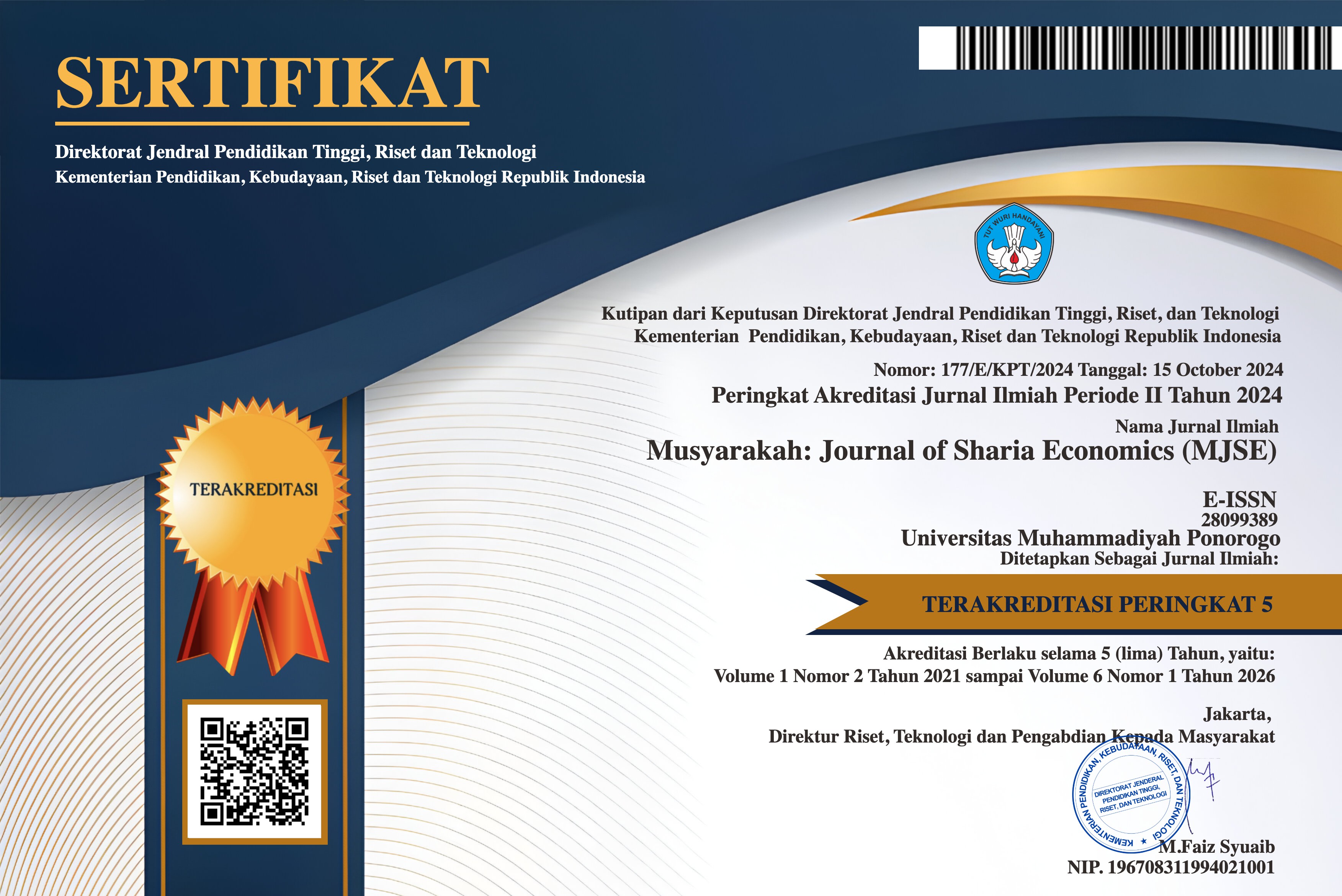Tantangan Inklusi Keuangan Syariah Era Disrupsi
DOI:
https://doi.org/10.24269/mjse.v12i2.8600Abstract This research aims to know and understand the Disruption Era and its impact on Sharia Financial Inclusion. Financial inclusion is an effort that makes it easy to access a more prosperous life for all people. This research uses a literature review research method, obtaining data from Scientific Journal literature and data related to Islamic Financial Inclusion in Indonesia. This inclusion program is very important for equal access to the entire community, especially for someone who is unbankable. In this program, the role of the government and financial institutions, both conventional and sharia, is very influential. Inclusive, stable finance will be achieved through five pillars and foundations, including; Financial Education Pillar, Community Property Rights Pillar; Product Pillar, Intermediation and Distribution Channels; Financial Services Pillar in the Government Sector; Consumer Protection Pillar. The impact that occurs in the development of Financial Inclusion in the era of disruption is the emergence of FinTech, which is able to open various facilities for consumers in using / utilizing various financial services digitally, such as: payments, loans, investments, and insurance.
References
Albanjari, Fatkhur Rohman. 2023. Inklusivitas Filantropi Islam: Menuju Lembaga Keuangan Sosial Berdaya Saing. Bandung: CV. Media Sains Indonesia.
Albanjari, Fatkhur Rohman. 2023. Social Financial Inclusion of Digital Based and Cooperation to Increase Competitiveness in Baitul Maal Wat Tamwil, International Journal of Islamic Thought and Humanities (IJITH), Vol. 2 No. 2, DOI: https://doi.org/10.54298/ijith.v2i2.102
Aripin Nasir Tajul, Nur Fatwa, and Mulawarman Hannase. 2022. “Layanan Digital Bank Syariah Sebagai Faktor Pendorong Indeks Literasi dan Inklusi Keuangan Syariahâ€. Syarikat: Jurnal Rumpun Ekonomi Syariah. Vo.5.No.1.
Badan Pusat Statistik, Sensus Penduduk, https://sensus.bps.go.id/topik/tabular/sp2020/85/175748/0. 39“
Barquin Sonia,dkk. 2019. Digital Banking in Indonesia: Building Loyalty and Generating Growth. tp.Global Banking Practice.
Imanuel Chrismastianto dan Adhitya Wulanata. 2017. “Analisis SWOT Implementasi Teknologi Finansial Terhadap Kualitas Layanan Perbankan Di Indonesiaâ€. Jurnal Ekonomi dan Bisnis. Vol.20.No.1.
Kasali Rhenald. 2017. Disruption: Tak Ada Yang Tak Bisa Diubah Sebelum Dihadapi, Motivasi Saja Tidak Cukup. Jakarta. Gramedia Pustaka Utama.
Mandira Sarma. 2022. “Index of Financial Inclusion – A Measure of Financial Sector Inclusiveness, Berlin Working Papers on Money, Finance, Trade and Developmentâ€.Vol.3.
Micu Ion and Alexandra. 2016. “Financial Technology (FinTech) and its Implementation on the Romanian Non-Banking Capital Market†Paper SEA: Practical Application of Science. Vol.11.
Ohoitimur Johanis. 2018. “Tantangan Bagi Perkembangan Ilmu Pengetahuan dan Peluang Bagi Lembaga Pendidikan Tinggi Johanis Ohoitimur, Jurnal Responsâ€.Vol.23. No.02.
Peraturan Presiden Republik Indonesia Nomor 82 Tahun 2016 Tentang Strategi Nasional Keuangan Inklusif. 2016.
Peraturan Presiden Republik Indonesia Nomor 82 Tahun 2016 Tentang Strategi Nasional Keuangan Inklusif,†1 September 2016.
Peraturan Presiden Nomor 114 tahun 2020 tentang Strategi Nasional Keuangan Inklusif.
Puspitasari Sindi, dkk.2020. “Indeks Inklusi Keuangan Syariah di Indonesiaâ€. Amwaluna: Jurnal Ekonomi Dan Keuangan Syariah. Vol.4.No.1.
Sary Cita. 2019. “Peer to Peer Lending Against Ease of Business Technology Acceptance Model (TAM) Approachâ€. Economica: Jurnal Bisnis Islam, Vol.10, No.2.
Savitri Astrid. 2019. Revolusi Industri 4.0 : Mengubah Tantangan Menjadi Peluang Di Era Disrupsi 4.0. Yogyakarta. Penerbit Genesis.
Susanto Tegar Wahyu and Tetty Widiyastuti. 2020. “Peran Inklusi Keuangan Berkaitan Dengan Produktivitas UMKM Yang Menjadi Agen 46 PT Bank Negara Indonesia (Persero) Tbk Kantor Cabang Blitarâ€. Jurnal Penelitian Manajemen Terapan. Vol.5.No.2.
Wahid, N. 2014. Keuangan Inklusif: Membongkar Hegemoni Keuangan. Jakarta. Kepustakaan Populer Gramedia.
Albanjari, Fatkhur Rohman. 2023. Social Financial Inclusion of Digital Based and Cooperation to Increase Competitiveness in Baitul Maal Wat Tamwil, International Journal of Islamic Thought and Humanities (IJITH), Vol. 2 No. 2, DOI: https://doi.org/10.54298/ijith.v2i2.102
Aripin Nasir Tajul, Nur Fatwa, and Mulawarman Hannase. 2022. “Layanan Digital Bank Syariah Sebagai Faktor Pendorong Indeks Literasi dan Inklusi Keuangan Syariahâ€. Syarikat: Jurnal Rumpun Ekonomi Syariah. Vo.5.No.1.
Badan Pusat Statistik, Sensus Penduduk, https://sensus.bps.go.id/topik/tabular/sp2020/85/175748/0. 39“
Barquin Sonia,dkk. 2019. Digital Banking in Indonesia: Building Loyalty and Generating Growth. tp.Global Banking Practice.
Imanuel Chrismastianto dan Adhitya Wulanata. 2017. “Analisis SWOT Implementasi Teknologi Finansial Terhadap Kualitas Layanan Perbankan Di Indonesiaâ€. Jurnal Ekonomi dan Bisnis. Vol.20.No.1.
Kasali Rhenald. 2017. Disruption: Tak Ada Yang Tak Bisa Diubah Sebelum Dihadapi, Motivasi Saja Tidak Cukup. Jakarta. Gramedia Pustaka Utama.
Mandira Sarma. 2022. “Index of Financial Inclusion – A Measure of Financial Sector Inclusiveness, Berlin Working Papers on Money, Finance, Trade and Developmentâ€.Vol.3.
Micu Ion and Alexandra. 2016. “Financial Technology (FinTech) and its Implementation on the Romanian Non-Banking Capital Market†Paper SEA: Practical Application of Science. Vol.11.
Ohoitimur Johanis. 2018. “Tantangan Bagi Perkembangan Ilmu Pengetahuan dan Peluang Bagi Lembaga Pendidikan Tinggi Johanis Ohoitimur, Jurnal Responsâ€.Vol.23. No.02.
Peraturan Presiden Republik Indonesia Nomor 82 Tahun 2016 Tentang Strategi Nasional Keuangan Inklusif. 2016.
Peraturan Presiden Republik Indonesia Nomor 82 Tahun 2016 Tentang Strategi Nasional Keuangan Inklusif,†1 September 2016.
Peraturan Presiden Nomor 114 tahun 2020 tentang Strategi Nasional Keuangan Inklusif.
Puspitasari Sindi, dkk.2020. “Indeks Inklusi Keuangan Syariah di Indonesiaâ€. Amwaluna: Jurnal Ekonomi Dan Keuangan Syariah. Vol.4.No.1.
Sary Cita. 2019. “Peer to Peer Lending Against Ease of Business Technology Acceptance Model (TAM) Approachâ€. Economica: Jurnal Bisnis Islam, Vol.10, No.2.
Savitri Astrid. 2019. Revolusi Industri 4.0 : Mengubah Tantangan Menjadi Peluang Di Era Disrupsi 4.0. Yogyakarta. Penerbit Genesis.
Susanto Tegar Wahyu and Tetty Widiyastuti. 2020. “Peran Inklusi Keuangan Berkaitan Dengan Produktivitas UMKM Yang Menjadi Agen 46 PT Bank Negara Indonesia (Persero) Tbk Kantor Cabang Blitarâ€. Jurnal Penelitian Manajemen Terapan. Vol.5.No.2.
Wahid, N. 2014. Keuangan Inklusif: Membongkar Hegemoni Keuangan. Jakarta. Kepustakaan Populer Gramedia.
Downloads
Published
2023-12-27
Issue
Section
Articles
License

Musyarakah: Journal of Sharia Economics (MJSE)Â Lisensi Creative Commons Atribusi-BerbagiSerupa 4.0 Internasional.


_1.png)
